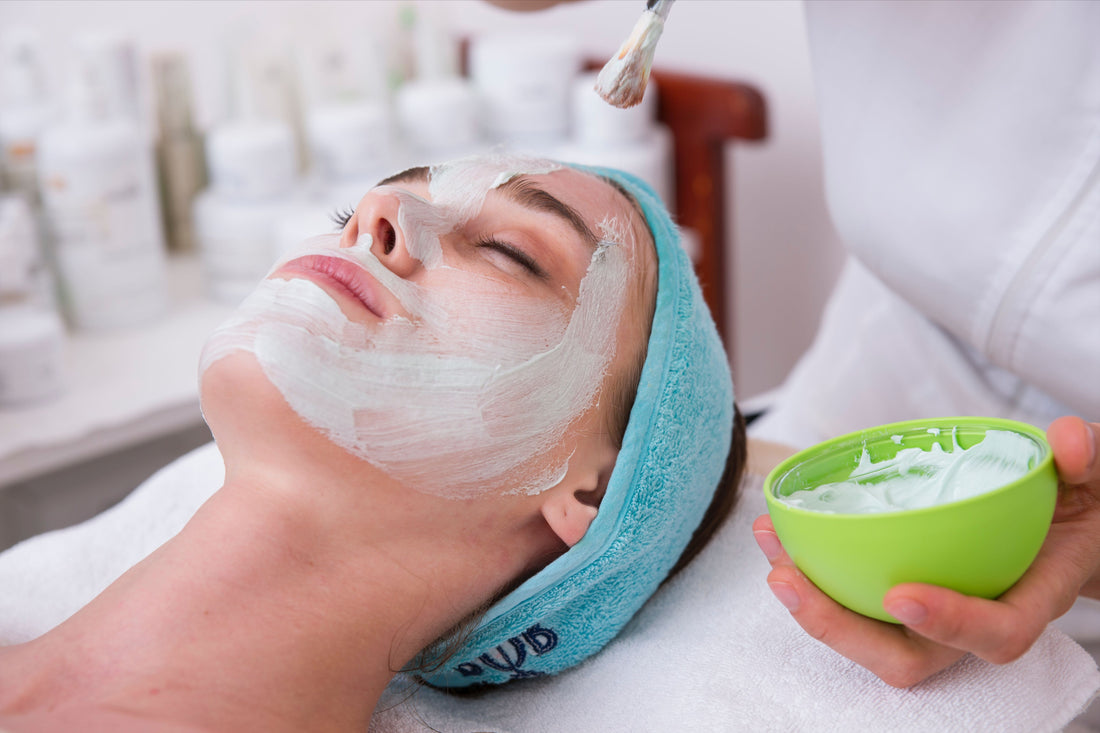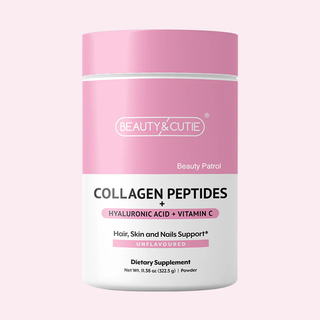Amidst the pursuit of healthy, radiant skin, a multitude of beauty products and treatments await. Yet, authentic skin well-being springs from within. In this post, we delve into the critical aspects that support skin health and provide expert recommendations on how to refill and rejuvenate your skin's foundation. This manual equips you with the information and resources you need to get the clear, supple skin you've always wanted, no matter what skin issues you've been facing (acne, dryness, aging).
How To Improve Skin Health
- Maintain a healthy diet: Improving skin health is possible through eating well. Eat more fruits, veggies, healthy fats, and lean proteins to obtain your daily dose of antioxidants, vitamins, and minerals. Repairing and nourishing the skin with these nutrients helps it seem healthy and young.
- Stay hydrated: Proper hydration is essential for maintaining healthy skin. Drink plenty of water throughout the day to keep your skin hydrated and prevent dryness. Additionally, limit your consumption of sugary and caffeinated beverages as they can dehydrate the skin.
- Protect your skin from the sun: Sun exposure is one of the leading causes of premature aging and skin damage. Always wear sunscreen with a high SPF when going outside, even on cloudy days. Apply it generously and reapply every two hours, especially if you are spending prolonged periods in the sun.
- Establish a regular skincare routine: Developing a consistent skincare routine is vital for improving skin health. Cleanse your face twice a day using a gentle cleanser suitable for your skin type. Follow up with a toner to remove any remaining impurities and balance the skin's pH levels. Apply a moisturizer to keep your skin hydrated and protected.
- Exfoliate regularly: Exfoliation helps to remove dead skin cells and unclog pores, allowing for better absorption of skincare products. Incorporate a gentle exfoliator into your routine once or twice a week, depending on your skin type. Be sure to choose a product that is suitable for your skin and avoid over-exfoliating, as it can cause irritation and damage.
- Get enough sleep: Adequate sleep is crucial for skin health. During sleep, your body repairs and rejuvenates itself, including your skin. Aim for 7-9 hours of quality sleep each night to allow your skin to regenerate and maintain its youthful appearance.
- Manage stress levels: High levels of stress can negatively impact your skin. Stress can trigger inflammation, breakouts, and other skin issues. Find healthy ways to manage stress, such as practicing yoga, deep breathing exercises, or engaging in hobbies that help you relax and unwind.
- Quit smoking and limit alcohol consumption: Smoking and excessive alcohol consumption can have detrimental effects on your skin. Smoking reduces blood flow circulation and oxygen to the skin, resulting in a dull and aged complexion. Alcohol can dehydrate the skin and lead to inflammation. Quit smoking and limit alcohol intake to improve your skin health.
- Exercise regularly: Regular exercise not only benefits your overall health but also improves your skin health. Working out improves blood flow, which in turn feeds the skin and makes it glow. Walk or ride a bike at a moderate pace for at least 30 minutes most days of the week.
Understanding Skin Health
Attaining the peak of skin care excellence hinges on a thorough comprehension of the skin's makeup and the elements that determine its health. The basis for a healthy, beautiful complexion begins with this information. Comprising the skin are three essential layers: the epidermis, dermis, and hypodermis. These layers collaborate, each playing a strong part in the form and function of our skin. Your skin's well-being is shaped by a combination of genetic inclinations, lifestyle preferences, and external surroundings. In concert, these elements ascertain the state of your skin.
Daily Skincare Routine
A consistent daily skincare routine is key to maintaining healthy skin. Follow these steps to achieve optimal skin health:
- Cleansing: Start your skincare routine by cleansing your face to remove dirt, oil, and impurities. Choose a gentle cleanser that suits your skin type, and wash your face twice a day – once in the morning and once before bed.
- Exfoliating: Exfoliation helps remove dead skin cells and unclog pores, allowing skincare products to penetrate better. Incorporate a gentle exfoliator into your routine once or twice a week, depending on your skin type. Be cautious not to over-exfoliate, as it may cause irritation.
- Moisturizing: Hydrating your skin is crucial for maintaining its health and preventing dryness. After cleansing and exfoliating, apply a moisturizer that suits your skin type. Look for ingredients such as hyaluronic acid, glycerin, and ceramides, which help retain moisture and restore the skin's natural barrier.
- Sun Protection: Protecting your skin from the harmful effects of the sun is essential for avoiding premature aging and reducing the risk of skin cancer. Apply a broad-spectrum sunscreen with an SPF of 30 or higher every day, even on cloudy days.
What Dietary Changes Can Improve Skin Health?
As a woman looking to improve your skin health, making certain dietary changes can have a significant impact on achieving that glowing complexion you desire. By incorporating specific foods into your diet, you can nourish your skin from within and enhance its overall health. Here are some dietary changes you can make to improve your skin health:
- Increase your intake of fruits and vegetables: Fruits and vegetables are rich in vitamins, minerals, and antioxidants that promote healthy skin. Include a variety of colorful options, such as berries, leafy greens, carrots, and tomatoes, as they contain essential nutrients for skin health.
- Consume omega-3 fatty acids: Omega-3 fatty acids are beneficial for skin health as they help to reduce inflammation and maintain the skin's moisture. Include sources like fatty fish (salmon, mackerel), chia seeds, flaxseeds, and walnuts in your diet.
- Opt for lean proteins: Incorporate lean proteins such as poultry, fish, and legumes into your meals. These proteins provide amino acids necessary for collagen production, which helps maintain skin elasticity and firmness.
- Stay hydrated: Drinking an adequate amount of water is crucial for skin health. It helps to flush out toxins, keeps your skin hydrated, and enhances its elasticity. Aim for at least 8 glasses of water per day or more if you are physically active.
- Reduce processed foods and sugar: Foods high in processed sugars and unhealthy fats can lead to inflammation.
How Often Should I Wash My Face To Maintain Healthy Skin?
Maintaining healthy skin is essential for both your appearance and overall well-being. One of the most basic and crucial steps in skincare is washing your face. But how often should you do it?
The frequency at which you should wash your face depends on various factors such as your skin type, lifestyle, and environmental conditions. Here are some guidelines to help you determine how often you should wash your face to maintain healthy skin:
- Twice a day for most skin types: In general, washing your face twice a day is recommended for most skin types. This means cleansing your face once in the morning and once before bed. This routine helps remove dirt, impurities, and excess oil that can accumulate throughout the day and overnight.
- Adjust based on your skin type: If you have oily or acne-prone skin, washing your face twice a day may be more beneficial to control excess oil and prevent clogged pores. On the other hand, if you have dry or sensitive skin, washing your face once a day might be sufficient to avoid stripping away natural oils and causing irritation. However, it's essential to listen to your skin and adjust accordingly.
- Consider your lifestyle and environment: If you engage in activities that make your face sweat heavily, such as workouts or outdoor labor, it's advisable to cleanse your face immediately afterward. Sweat can mix with bacteria and oils on your skin's surface, potentially leading to clogged pores and breakouts. Similarly, if you live in a polluted environment or wear heavy makeup daily, you may need to wash your face more frequently to remove dirt and pollutants from your skin.
Conclusion
In summary, the foundation for maintaining healthy skin rests on the synergy between effective skincare habits and the incorporation of a balanced and health-oriented lifestyle. Maintaining clean and clear skin begins with regular face washing according to your skin type and the surrounding environment. Remember to use gentle cleansers, avoid harsh scrubbing, and moisturize appropriately to maintain your skin's natural balance. Elevate your skin's vitality by incorporating supplementary skincare habits like sunscreen usage, exfoliation, adequate hydration, and a diet free of processed foods and excessive sugar. If you follow these guidelines religiously, your skin will be clear and glowing in no time.
Final Thoughts
Discover the ultimate beauty solution with Beauty and Cutie's collagen powders. Specially formulated to nourish your hair, skin, and nails, our collagen powders help you achieve luscious, voluminous hair and a radiant complexion. Be part of the countless Americans who have found their path to wellness and beauty with Beauty and Cutie.
Sources
- https://www.healthline.com/nutrition/12-foods-for-healthy-skin
- https://www.aad.org/public/everyday-care/skin-care-secrets/routine/healthier-looking-skin
- https://health.clevelandclinic.org/23-foods-good-skin/
- https://www.everydayhealth.com/beauty-pictures/everything-you-didnt-know-about-washing-your-face.aspx
*These statements have not been evaluated by the Food and Drug Administration. This product is not intended to diagnose, treat, cure or prevent any diseases.


